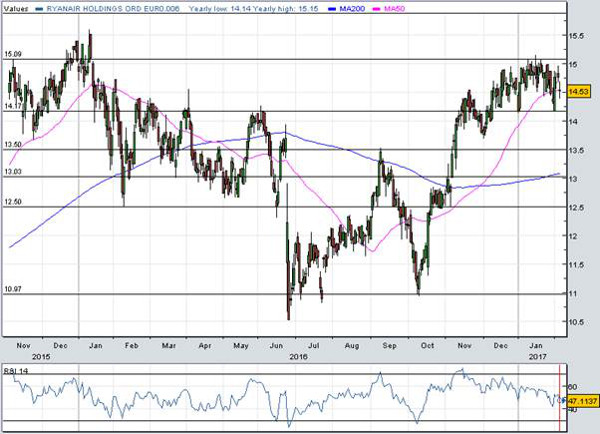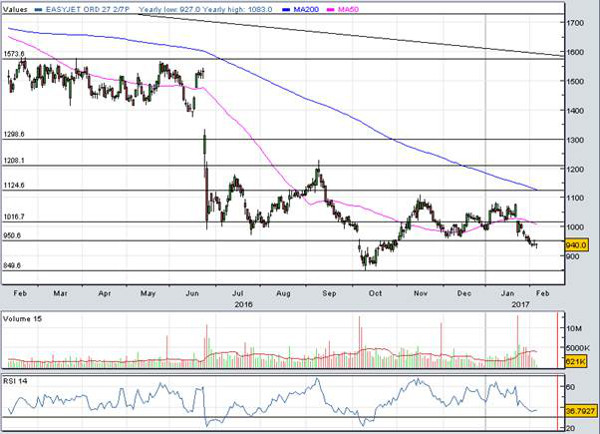Is Ryanair still pick of the budget airlines?
6th February 2017 12:45
is flying more passengers than ever before, revenue rose during the third quarter, and costs are falling fast. Unfortunately, so is profit, and by more than expected, caused by a slump in fares as the budget carriers fight for market share. Having risen as much as 38% since October, it's no wonder the shares are flying low Monday.
Certainly, Ryanair has been hugely successful in growing traffic. During the three months, it added 10 aircraft to its hangar, opened five bases and launched 95 new routes, driving passenger numbers up 16% to 29 million. And the load factor – a measure of how well an airline fills its planes – was a record 95% for the quarter.
However, other low-cost carriers are doing the same, and all this extra capacity has forced them all to slash ticket prices. Ryanair's average fare fell 17% to just €33 per passenger, worse than the 13-15% decline predicted by the company.
Chief executive Michael O'Leary blamed the dive in sterling since last summer's Brexit vote, and uncertainty here is tipped to be a running theme. Airlines also continue to switch capacity from trouble spots like Turkey, Egypt and North Africa into Spain and Portugal, which he admits will keep prices low, certainly until the end of the current financial year to March, and through to 2018.

Revenues increased by 1% in the final three months of 2016 to €1.345 billion (£1.156 billion), less than consensus estimates of €1.361 billion. And Ryanair said its outlook for the remainder of its current financial year "is cautious", warning: "With less than two months of the year to go, and no Easter in March, we expect Q4 yields to decline by as much as -15%."
However, a 12% reduction in unit costs - only half of which was due to lower year-on-year fuel prices - was better than previous guidance. That capped the quarterly decline in profit after tax at 8% to €95 million, lower than the €108 million analysts at UBS were after, but only a whisker away from consensus estimates.
Ryanair also thinks full-year costs, excluding fuel, will now fall by 4%, rather than 3% previously. It also maintains full-year profit guidance at €1.3-€1.35 billion, which is significant and helps explain why the shares haven't sold off much more than 2% Monday.
Peer downgrades
"Holding expectations is reassuring given downgrades at and ," writes Panmure Gordon analyst Mark Irvine-Fortescue, "but -17% revenue yield is worse than expected and comments that pricing for FY18 will continue to be challenging, is likely to curb any enthusiasm."
He still rates Ryanair a 'buy' with €17 price target, implying 18% potential upside. "We do see scope for divergence in performance, with lower valuations presenting an opportunity to pick up structural winners like Ryanair, which enjoys best-in-class unit costs, and balance sheet, enabling it to employ capacity growth profitably.
"Our 'buy' rating is predicated on ancillary revenue and MAX aircraft deliveries supporting the next leg of market outperformance."
Airline investors must now ask themselves whether to keep backing Ryanair, despite the share price rally, or shift attention to the classic contrarian play, struggling serial profit-warner easyJet, currently threatening to make the short trip to a new four-year low.

At 940p, easyJet trades on 11.5 times Panmure's earnings per share forecasts for the year to September 2017. Ryanair - which historically trades at a premium to its orange-liveried rival - is on 13.6 times forecasts for March 2017, dropping to 12.5 for next year.
Irvine-Fortescue said after last month's first-quarter results, that easyJet shares do not look "optically expensive until you factor in the downward profit trajectory, negative [free cash flow] and [return on capital employed] trending down towards [weighted average cost of capital]".
"Our 820p target price equates to 10x PE, 5.7x EV/EBITDAR, a better reflection of the internal and external challenges facing the business, which could prove to be the new normal."
Panmure's position is clear, and the thinking is sound. We'd also point out that while Ryanair is successfully cutting costs, easyJet actually had to spend more – excluding fuel - in the last three months of 2016. Passenger growth of 8.2% was also offset by an identical drop in revenue per seat at constant currency.
And, glancing at the technicals, there's an obvious risk that easyJet could revisit the October low at around 850p before industry fundamentals have time to improve.
This article is for information and discussion purposes only and does not form a recommendation to invest or otherwise. The value of an investment may fall. The investments referred to in this article may not be suitable for all investors, and if in doubt, an investor should seek advice from a qualified investment adviser.
Editor's Picks